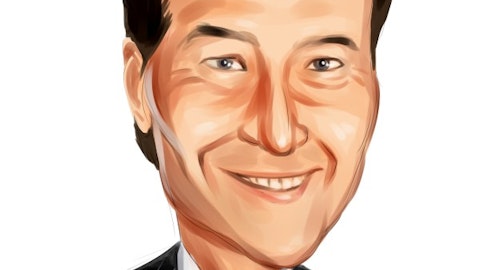Robert Dickerson: Yeah. No problem.
Operator: And your next question comes from the line of Carla Casella from JPMorgan. Your line is open.
Carla Casella: My biggest questions on the EBITDA add-backs that you have for the covenant adjusted. Can you just give us the basis for that — the $65 million one?
Pat O’Donnell: So you’re talking about in the appendix?
Carla Casella: Exactly. Covenant just EBITDA looks like it’s over $400 million, whereas we calculate $300 million, as you show in your other. I’m just wondering what the difference is? Is it go-forward cost savings or ?
Pat O’Donnell: Yeah. I think the footnote down there has — it’s a lot of the Meal Pep transaction related costs that were being added back or within that category. They’re allowable under the credit agreement.
Carla Casella: Okay. So your $300 million EBITDA has some other noncash charges that you haven’t added back as well. It looks like there’s another $44 million. Are those charges that just won’t recur or they were — they’re not allowed to — I don’t understand why you don’t add the Mac in your EBITDA adjustments?
Pat O’Donnell: No, those are other sort of noncash write-offs as defined in the credit agreement. There’s things like inventory write-offs and other elements that, as defined, are part of the covenant calculation.
Carla Casella: Okay. And then you’ve got a $427 million note receivable on the balance sheet. When do you expect to monetize that? And have you thought about what — how you would allocate the proceeds?
Pat O’Donnell: Yeah. We don’t have an expectation of when to monetize that. I think given the dislocation in the credit markets and having to probably speculate a bit about Winland’s intent in terms of when they may choose to refinance, I don’t think we’re in a position to sort of guesstimate when that might be. But we’re really happy with the return that, that note provides and to be able to go reinvest some of that interest back into the business. And so we’ll continue to carry that right now. And we feel good about the direction of the business on the Winland side as well.
Steve Oakland: Though I do think capital allocation is a great question, right? And when I arrived, we had to prioritize paying down debt, right? We now have our balance sheet in a really good place where we can have a much more balanced capital allocation strategy. We will maintain a very strong balance sheet. We’re there now. We’ll continue that, but we can also now invest in our business. That will be our primary look is how can we get — because we think the returns in our business are so strong. And then what are the other opportunities? Can we return some capital to shareholders? And what else can we do with it? But we now have a much more balanced opportunity than we’ve had in the past where we really want to get our debt structure right and our balance sheet right. And having the transaction allowed us to make a big step change there. So that’s why we feel better about the growth numbers that we’re able to talk about today because we can invest to drive them.
Carla Casella: That’s great. Super helpful. Thank you.
Pat O’Donnell: Circling back to the D&A question from earlier, we think that will be about $145 million to $150 million.
Operator: And your next question comes from the line of William Reuter from Bank of America. Your line is open.
William Reuter: Good morning. Earlier, when you were talking about how half of your CapEx is going to be for driving capacity expansion and better innovation for your customers, I think you made some reference to potentially purchasing capacity. I guess, is that on the radar in terms of other facilities for sale that may allow you to, I guess, more aggressively grow — that would speed up your ability to grow the top line?
Steve Oakland: I think there will be some stuff available, yes. But it has to be right. And we’re incredibly careful there. And it has to meet the right category, the right location and the right capability. So there may be some opportunities for some very small purchases, and there may be some — I don’t think anything would be huge, but there may be some other opportunities out there. So those things happen when they happen. We can’t speculate on exact timing of that.





